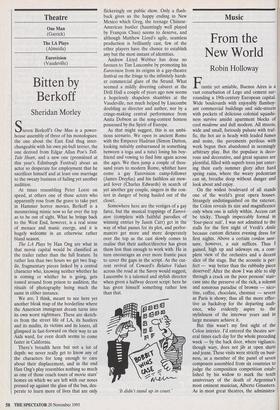Theatre
One Man (Garrick) The LA Plays (Almeida) Eurovision (Vaudeville)
Bitten by Berkoff
Sheridan Morley
Steven Berkoff's One Man is a power- house assembly of three of his monologues: the one about the East End thug inter- changeable with his own pit-bull terrier, the one derived from Edgar Allan Poe's Tell- Tale Heart, and a new one (premiered at this year's Edinburgh Festival) about an actor so desperate for employment that he sacrifices himself and at least one marriage to the sweaty business of failing yet another audition.
At times resembling Peter Lorre on speed, at others one of those actors who apparently rose from the grave to take part in Hammer horror movies, Berkoff is a mesmerising mimic now so far over the top as to be out of sight. What he brings back to the West End, however, is a real sense of menace and manic energy, and it is hugely welcome in an otherwise rather bland season.
The LA Plays by Han Ong are what in that movie capital would be classified as the trailer rather than the full feature. In rather less than two hours we get two frag- ile, fragmentary pieces linked by a central character who, knowing neither whether he is coming or whither he is going, gets tossed around from prison to audition, the rituals of photography being much the same in either instance.
We are, I think, meant to see here yet another bleak map of the borderline where the American immigrant dream turns into its own worst nightmare. These are sketch- es from the street life of LA, its hustlers and its misfits, its victims and its losers, all glimpsed in fast-forward on their way to an Aids ward, for even death seems to come faster in California.
There's breadth here but not a lot of depth: we never really get to know any of the characters for long enough to care about their displacement, and in the end Han Ong's play resembles nothing so much as one of those coach tours of movie stars' homes on which we are left with our noses pressed up against the glass of the bus, des- perate to learn more of lives that are only flickeringly on public show. Only a flash- back gives us the happy ending in New Mexico which Greg, the teenage Chinese- American hustler (hauntingly well played by Francois Chau) seems to deserve, and although Matthew Lloyd's agile, seamless production is brilliantly cast, few of the other players have the chance to establish any but the most instant of identities.
Andrew Lloyd Webber has done no favours to Tim Luscombe by promoting his Eurovision from its origins in a gay-theatre festival on the fringe to the infinitely harsh- er commercial glare of the Strand. What seemed a mildly diverting cabaret at the Drill Hall a couple of years ago now seems a hopelessly shapeless shambles at the Vaudeville, not much helped by Luscombe doubling as director and author, nor by a cringe-making central performance from Anita Dobson as the song-contest hostess possessed by the Spirit of Europe.
As that might suggest, this is an ambi- tious scenario. We open in ancient Rome with the Emperor Hadrian (Simon Dutton, looking suitably embarrassed in something between a toga and a tutu) losing his boy- friend and vowing to find him again across the ages. We then jump a couple of thou- sand years to modern Rome, whither have come a gay Eurovision camp-follower (James Dreyfus) and his faithless air stew- ard lover (Charles Edwards) in search of yet another gay couple, singers in the con- test in danger of being hauled out of the closet.
Somewhere here are the vestiges of a gay farce, but the musical trappings of Eurovi- sion (complete with faithful parodies of winning entries by Jason Carr) get in the way of what passes for its plot, and perfor- mances get more and more desperately over the top as the cast slowly comes to realise that their author/director has given them less than enough to work with. He in turn encourages an ever more frantic pace to cover the gaps in the script. As the cur- rent revival of Coward's Relative Values across the road at the Savoy would suggest, Luscombe is a talented and stylish director when given a halfway decent script: here he has given himself something rather less than that.










































































 Previous page
Previous page